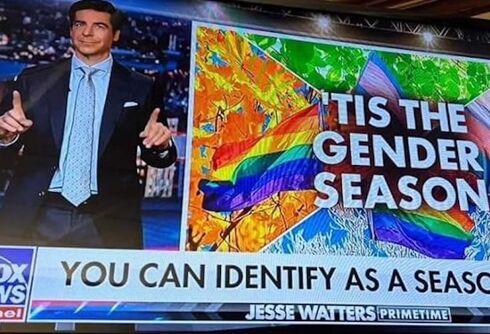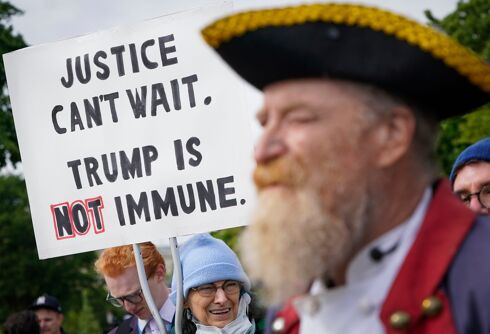
Things have hit the fan in the wake of the signing of the Indiana Religious Freedom Restoration Act (RFRA) by GOP Gov. Mike Pence.
Pence and other defenders of the bill argued that it was the same as the other state RFRAs, as well as the federal RFRA signed by President Bill Clinton. Discrimination was not intended, so what was everyone so upset about?
The claim that the bill did not intend to protect discrimination collapsed as civil rights activists (such as the Indiana ACLU) quickly proved that discrimination was exactly the intent. It is revealing how important it was to conservatives that the bill not be seen as discriminatory – using false claims about the federal and other state level RFRAs as a cover.
But also revealing is their attempt to reinterpret the intentions of the authors of the federal and other state RFRAs. This is of a piece with the long-term Christian Right campaign to redefine religious liberty in the country in terms favorable to their theocratic vision.
Conservative Republican politicians, their apologists (like The New York Times columnist David Brooks), and allied groups suggested that the bills are essentially the same.
Even some Christian Right leaders like Tony Perkins of the Family Research Council bent the truth, claimed that Indiana merely joined “19 other states in aligning themselves with federal religious freedom law.” (Even though state-level Christian Right leaders who backed the bill have been clear about its intentions.)
The Times’ own reporting cited legal scholars, including Columbia Law School professor Katherine Franke, who said that the Indiana is not the same as the federal law or the Illinois state law supported by President Obama when he served in the Illinois State Senate.
Article continues below
The Indiana measure also grants parties the right to bring legal action to prevent a ‘likely’ burden on religious belief, even before any burden is imposed. And it expands the situations in which the protection could be invoked to include disputes between private parties engaged in lawsuits, even if they do not involve any direct actions by a government agency.”

[ Previous ]
The fact is that the federal RFRA, and most of the past state RFRAs, apply only to government actions. The original purpose of the legislation was to restore individual religious liberty taken away by the Supreme Court in the case of Employment Division v Smith, which involved Native Americans being denied state benefits in Oregon because they had been fired for using peyote in religious ceremonies.
A later Court ruling limited the reach of the federal RFRA to the actions of the federal government only, hence the beginning of the state level RFRAs.
However, since the Hobby Lobby v. Burwell Supreme Court ruling in 2014, Christian Right agencies like Alliance Defending Freedom, The Becket Fund, the Mormon Church, and allies at the United States Catholic Conference of Bishops, have pushed state-level RFRAs that extend exemptions to corporations and individuals – allowing measures of discrimination in the face of religious claims that to provide services to LGBTQ people violates their consciences.
The Hobby Lobby case, for the first time, granted a private business religious standing. In that case, the chain of craft stores was allowed to claim a religious exemption from providing employees with healthcare insurance covering four kinds of contraceptives, because the company owners believe (medical science not withstanding) they are abortifacients.
Borrowing language from the federal RFRA, on which the original case filed by The Becket Fund for Religious Liberty was based, Justice Alito, writing for the majority, said the government’s requirement that Hobby Lobby provide this contraceptive coverage imposed a “substantial burden” on their religious liberty.
Article continues below
The first of these Hobby Lobbyized RFRAs was passed in Arizona, but was ultimately vetoed by the governor. A similar bill was passed and signed into law in Mississippi.
Justice Ginsberg’s concerns are being realized in the efforts to insert Hobby Lobbyized provisions into state RFRAs. What is curious is that are engaging in an odd and easily refutable historical revisionism in claiming that the Hobby Lobbyized RFRAs was the intention all along—even though the federal RFRA was passed in 1993.
The turning point in the national controversy was probably the debacle on ABC, when Governor Pence repeatedly claimed that the Indiana bill was the same as the others, and refused to say whether or not he supported anti-LGBTQ discrimination, saying that the “Religious Freedom Restoration Act was signed into federal law by President Bill Clinton more than 20 years ago. … And after last year’s Hobby Lobby case, Indiana properly brought the same version that then state senator Barack Obama voted for in Illinois before our legislature”
The Indianapolis Star reported on April 2nd that Pence’s talking points did not square with the facts. The Indiana bill is not the same as the federal RFRA and most of the state RFRA’s—including Illinois—but the post-Hobby Lobby timing is telling. The shorthand for the bill around the legislature was “the Hobby Lobby bill.”
Article continues below
While the struggle over the definition of religious freedom is far from over, the battle lines are becoming clearer.















Not all the same: Christian Right’s Hobby Lobbyization of RFRAs hits the fan